
Tulu is a Dravidian language whose speakers are concentrated in Dakshina Kannada and in the southern part of Udupi of Karnataka in south-western India and also in the northern parts of the Kasaragod district of Kerala. The native speakers of Tulu are referred to as Tuluva or Tulu people and the geographical area is unofficially called Tulu Nadu.

Dakshina Kannada district is located in the state of Karnataka in India, with its headquarters in the coastal city of Mangalore. It is part of the larger Tulu Nadu region. The district covers an area nestled in between the Western Ghats to its east and the Arabian Sea to its west. Dakshina Kannada receives abundant rainfall during the Indian monsoon. It is bordered by Udupi district to the north, Chikmagalur district to the northeast, Hassan district to the east, Kodagu to the southeast and Kasaragod district of Kerala to the south. According to the 2011 census of India, Dakshina Kannada district had a population of 2,083,625. It is the only district in Karnataka state to have all modes of transport like road, rail, water and air due to the presence of a major hub, Mangalore. This financial district is also known as the Cradle of Indian banking.

The Tulu people or Tuluvas are an ethno-linguistic and ethno-cultural group from Southern India. They are native speakers of the Tulu language and the region they traditionally inhabit is known as Tulu Nadu. This region comprises the districts of Dakshina Kannada and Udupi in Karnataka and part of Kasaragod district in Kerala, with Mangalore, Karnataka being the commercial hub. The Census report of 2011 reported a population of 1,846,427 native Tulu speakers living in India.
The Bunt people are an Indian community who historically have inhabited the districts of coastal Karnataka, in South India. Bunts were traditionally a warrior-class community, with agrarian origins, forming the landed gentry of the region. They are the dominant land-owning and farming community of Tulu Nadu, and speak Tulu as well as Kundagannada as their mother tongue. Today, the Bunts are a largely urbanised community, with a population size of less than one million, worldwide.

Būta Kōlā, also referred to as Daiva Kōlā or Daiva Nēmā, is a shamanistic dance performance prevalent among the Hindus of Tulu Nadu and parts of Malenadu of Karnataka and Kasargod in northern Kerala, India. The dance is highly stylized and performed as part of 'Bhootaradhane' or worship of the local deities worshipped by the Tulu speaking population. It has influenced Yakshagana folk theatre. Būta kōlā is closely related to Theyyam of North Malabar region.
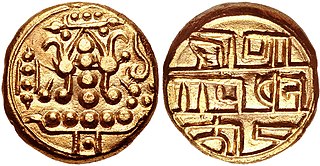
The Alupa dynasty was an ancient ruling dynasty of India. The kingdom they ruled was known as Alvakheda Arusasira and its territory spanned the coastal districts of the modern Indian state known as Karnataka. The Alupas in their prime were an independent dynasty, centuries after reigning due to the dominance of Kadambas from Banavasi, they became feudatory to them. Later they became the vassals of the Chalukyas, Rashtrakutas, Hoysalas with the change in political scenario of Southern India. Their influence over coastal Karnataka lasted for about 1200 years. There is evidence that the Alupas followed the law of matrilineal inheritance (Appekatt/Aliyasantana) since the Alupa king Soyideva was succeeded by his nephew Kulasekhara Bankideva. The legendary king who is credited with introducing matrilineality in Alva Kheda|Tulu Vishaya Kheda is named Bhuta Alupa Pandya The descendants of this dynasty still survive to this date and have spread in the karavali region and they are widely referred to as the Bunt. The Bunts follow Matrilineality instead of the common Patrilineality, and are said to be Nagavanshi Kshatriyas by their maternal origin. They can be identified with their surnames such as Shetty, Rai, Hegde, Alva, Chowta etc. Even though most Bunt are Hindus by faith now, The sizeable section of the community still follows Jainism and they are called Jain Bunt The last Alupa king to have ruled is Kulasekharadeva Alupendradeva whose inscription dated 1444 CE have been found in Mudabidri Jain Basadi.
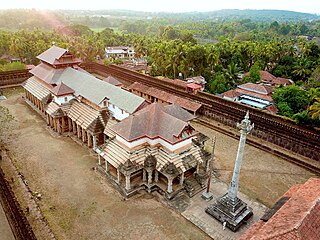
MoodabidriMūḍubidire;, is a town and taluk in Dakshina Kannada district. It lies 34 km northeast of the district headquarters, Mangalore, in Karnataka, India.
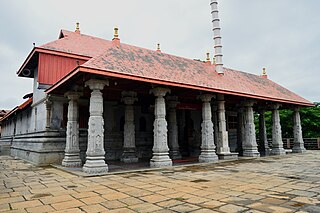
Kunjarugiri is a village in Udupi district in the Indian state of Karnataka. It is located about 11 kilometres (6.8 mi) from Udupi City, near Shankarapura. The main attraction of the village is a hill, known as Durga Betta, on which stands a temple of Durga, known to locals in the Tulu language as Kunjar Amma. Parashurama is credited with erecting the temple in honour of the divine mother, Adi Shakti. It is said that when he created Kerala, he found in the depth of the sea a pearl, which he fashioned into a nose ring and decorated the idol of Kunjaru Amma with. According to legend, however, the sea always retrieves whatever is taken from it. To protect the idol for a long time, Parashurama installed the idol on the Kunjaru hill; but to this day, the sea keeps coming closer to the hill. The hill comprises nearly 250–300 stairs as a pathway leading to the Kunjarugiri temple. Thousands of school children visit every year as a part of the school trips. Foreign tourists also visit the place Udupi which stands on the Konkan coast. During "Krishna Janmashtami"( the day lord Krishna was born), thousands of visitors are seen in the streets of Udupi.
Mangalore district that was partitioned from the erstwhile South Canara, has been multicultural and is a little different from the prevalent culture of the Carnataca state of India. A native of Mangalore is known as a Mangalorean in English, Kudladakulu in Tulu, Kodyaalkar in Konknni, Manglurnavaru in Kannada& Maikaaltanga in Byari.
Mandarthi is located 12 km from Brahmavar in the Brahmavara taluk of Udupi District in Karnataka state, India. The name derives from 'Manda-Aarathi' from Kannada, meaning the holy light.
Mangaloreans are a collection of diverse ethnic groups that hail from the historical locales of South Canara (Tulunaad) on the south western coast of Karnataka, India, particularly the residents native to Mangaluru.

Karkala, also known as Karla in Tulu language, is a town and the headquarters of Karkala taluk in the Udupi district of Karnataka, India. Located about 60 km from Mangalore in the Tulu Nadu region of the state, it lies near the foothills of the Western Ghats. Karkala has a number of natural and historical landmarks, and is a major tourist and transit destination due to its strategic location along the way to Hebri, Sringeri, Kalasa, Horanadu, Udupi, Kollur, Subrahmanya and Dharmasthala.
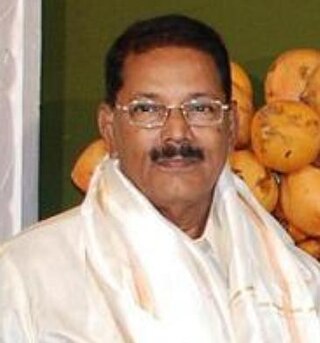
Bola Chittaranjan Shetty is a famous Tulu and Kannada writer, who was the president of the 16th Mangalore Taluk Kannada Sahitya Sammelan held in year 2010. He died at his residence on 7 August 2016, and his cremation was held at Kuthar Guthu. He was 72.

Ashwini Chidananda Shetty Akkunji is an Indian sprint athlete from Siddapura, Udupi who specializes in 400 metres. Ashwini has won gold medals at the 2010 Commonwealth Games and the 2010 Asian Games in 4x400 m relay team event with Manjeet Kaur, Mandeep Kaur and Sini Jose and an individual gold medal in the 400 metres hurdles on 25 November 2010 at the 2010 Asian Games held at Guangzhou, in China. She is also a recipient of the Rajyotsava Prashasti (2010), a civilian honour awarded by the Indian State Government of Karnataka

Tulu cinema, also known as Coastalwood, is a part of Indian cinema. The Tulu film industry produces five to seven films annually. The first Tulu film was Enna Thangadi released in 1971. Earlier, these films were released in theatres across the Tulu Nadu region. Tulu film industry has grown to such an extent that films are being released simultaneously in Mangalore, Udupi, Mumbai, Bangalore and Middle East. The critically acclaimed Tulu film Suddha won the award for the best Indian Film at the Osian's Cinefan Festival of Asian and Arab Cinema held in New Delhi in 2006. In 2011, the Tulu film Industry got a second lease of life with the release of the film Oriyardori Asal. The film turned out to be the biggest hit in Tulu film history to date. Chaali Polilu is the longest running film in Tulu film industry. This movie is the highest-grossing film in the Tulu film industry. It has successfully completed 470 days at PVR Cinemas in Mangalore.

Ekka Saka is a Tulu language film, directed by K. Sooraj Shetty and produced by Lion Kishore D. Shetty for Lukumi Cine Creations. It stars Hitesh Naik and Sonal Monteiro. The film was released on 1 May 2015.
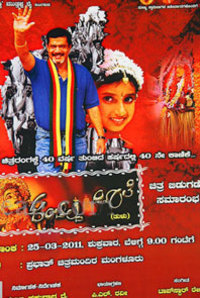
Kanchilda Baale is a Tulu Language Film directed and produced by Raghunath Rai Kumbra. Charithra Hedge from Udupi has acted in the title role Kanchilda Baale. A film showing conflict between superstitions and beliefs of people highlights the bhootharadhane of the region.
Rakteswari, identified as an aspect of Adi Parashakti, also known as Durga Parameswari, is a principal and popular form of Hindu goddess worshipped mainly in Parshurama Kshetras. Rakteswari is the iṣṭa-devatā of Tulu Nadu.














